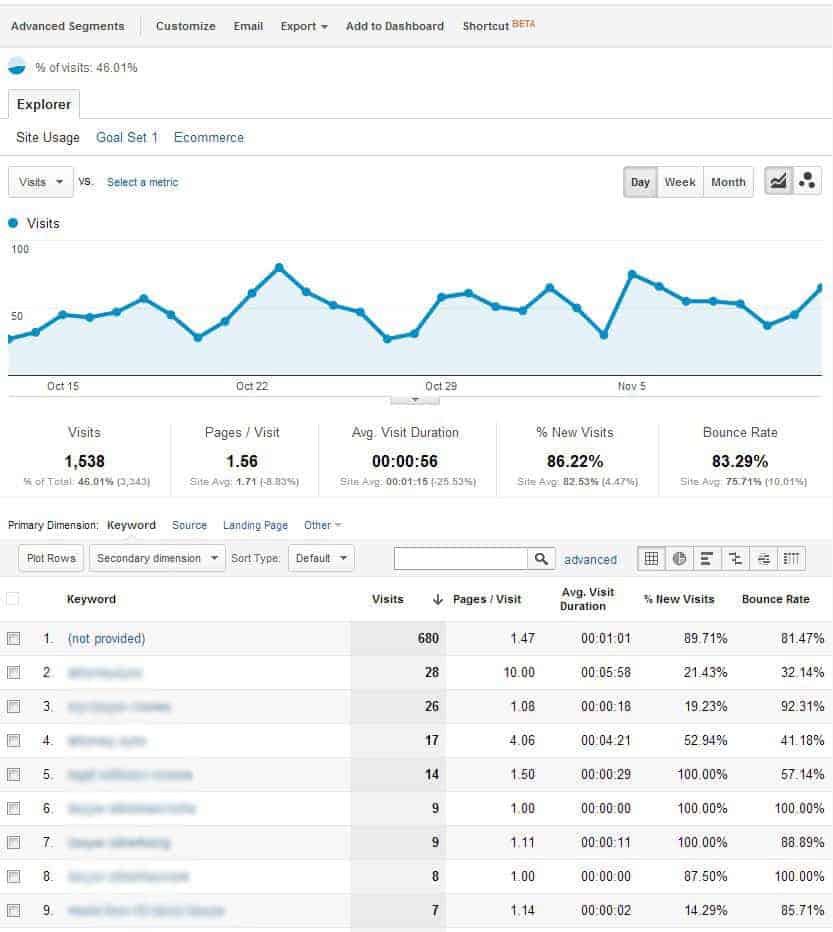One of the more challenging aspects of SEO is being able to "connect the dots" between all the moving parts in order to assess how it's working. I speak with many law firms that have a vague understanding of what metrics are important and why. A lawyer certainly understands that the end goal is to get more leads and cases from the efforts. Beyond that, the jump usually goes to "What are my rankings?" While rankings are a component of SEO, they are really more of a means to an end. By that I mean, rankings are only valuable if they are bringing in traffic as a result of having a particular ranking. This may sound obvious, but sometimes attorneys get fixated on the ranking for a specific term or set of terms and don't bother to analyze if the term is actually bringing visitors to the site. This doesn't even begin to address all of the variations of personalized results that effect rankings including search plus your world, search history personalization, location based results, etc.
The point is that assessing the effectiveness of your SEO campaign based solely on your rankings does not give you a complete picture. While there are several important reports and metrics you should be monitoring along with your SEO professional, one that I would like to discuss today is your "Organic Search Traffic Keyword Report".
What this report is showing you are the keywords that people searched for and subsequent to performing that search, clicked on your site in the organic results.

The organic search traffic report can be located under "Standard Reporting" -> Traffic Sources -> Sources -> Search -> Organic.


The report will default to "Primary Dimension: Keyword, which displays the keywords people are using to find the site in organic search.
The keywords can typically be divided into three categories: not provided, branded, and unbranded.
(not provided)
Google made a change a little over a year ago that impacted the keyword data you receive in this report. In short, if a user is logged into a Google account while performing a search, the actual keyword they searched for will no longer appear in the report. Rather, the visit is dropped into a "catch-all" called (not provided). While we know that a visitor came to the website, we are not able to see what they searched for to get there.
Branded Keywords
These include terms that contain your law firm's name and individual attorney names. In other words, people who have heard of the firm from somewhere and are looking you up online.
Unbranded Keywords
These include all the rest of the terms that aren't associated with your name or the firm name directly. What you want to see here is relevancy to what it is that your firm does. The terms should include a mix of people looking for attorneys in your practice areas, research on questions they have about their legal issues, terms associated with your legal services, etc. This is where the rubber meets the road with your search traffic. If you aren't seeing relevancy with the organic traffic you are getting, than likely you are not seeing a lot of new case inquiries coming via search.
With this report, you can also see how many visits you are receiving for individual search terms. This is a good way to connect the dots between your ranking for a term and how much search traffic it's actually sending to your site.
You can further slice and dice the data (or check on your traffic for specific search terms) by clicking the "advanced" link under dimensions and setting additional parameters.

For instance, perhaps you would like to see all of the terms that include the city that your firm is located in. You would click "advanced", select "Include" with "Keyword Containing" and then type the name of the city. This would show all of the search terms that include the city name in the search.
The key takeaway is to get a better understanding of the makeup of your organic search traffic and the relevancy of the traffic you are getting to your practice.

Here's a recent Google SERP for "𝘄𝗵𝗼 𝗮𝗿𝗲 𝘁𝗵𝗲 𝗯𝗲𝘀𝘁 𝗰𝗮𝗿 𝗮𝗰𝗰𝗶𝗱𝗲𝗻𝘁 𝗹𝗮𝘄𝘆𝗲𝗿𝘀 𝗶𝗻 𝗽𝗵𝗶𝗹𝗮𝗱𝗲𝗹𝗽𝗵𝗶𝗮." Ads? ❌LSAs? ❌Local Pack? ❌Links? ❌ 🔷 AI Overview? ✅ 6 firms listed. Only one tiny 🔗. Click the 𝗦𝗵𝗼𝘄 𝗺𝗼𝗿𝗲 button? 𝗬𝗼𝘂 𝗴𝗲𝘁: Here's a more detailed look at some of these firms: THE PEARCE LAW FIRM, P.C.Edith Pearce, […]
On April 22, 2025, Google sent an email updating Local Services Ads Additional Terms for Providers: Subject: Action required: important updates to Local Service Ads Additional Terms Many people are arguing that lawyers cannot participate in Local Services Ads, as this would constitute a per se violation of the Rules of Professional Conduct related to […]
Conrad and I recently joined Zack at Lawyerist to record a conversation about AI and marketing. You might think that we spend the whole time on how lawyers can use AI to publish content. You'd be wrong. While AI can certainly support publishing, there are many more interesting ways to use it in legal marketing. […]
As more legal services consumers turn to ChatGPT for local law firm recommendations, a fascinating intersection between AI, search, and maps unfolds. While Google remains the undisputed leader in local business data, ChatGPT is increasingly becoming an entry point for searchers seeking legal representation. But here’s the kicker: instead of keeping users within its ecosystem, […]
When law firms contact us, they usually want to talk: • PPC Ads • SEO Rankings • Lead Generation Very few want to talk: • Brand • Trust & Recognition • Emotional Connection Admittedly, much of this concerns that AttorneySync is known for lead generation across those common digital channels. But even when we start […]
According to an October 2024 study by SE Ranking: "The legal niche triggers the highest percentage of AIOs (77.67%). The average number of links matched between the AI Overview resources and the top 20 search results was 6.49 for legal topics. AI Overviews for legal topics most frequently link to NYCourts.gov (114 links), YouTube.com (48 […]
I'm grateful for my friend, Charley Mann of Law firm Alchemy. If you're a lawyer, subscribe to his Free Email List. In a recent email, Charley calls out bad guru advice on hiring: "Trying to execute a major SEO improvement? You need to find people who will help you, instead of trying to DIY it […]
If you’ve spent any time on LinkedIn, you’ve likely seen posts from law firm SEO experts showing off charts with an “up and to the right” trajectory. These screenshots, often pulled from tools like Semrush or Ahrefs, are meant to signal SEO success. And it’s not just the agencies celebrating—𝗹𝗮𝘄 𝗳𝗶𝗿𝗺𝘀 𝘁𝗵𝗮𝘁 𝗵𝗮𝘃𝗲 𝗵𝗶𝗿𝗲𝗱 𝘁𝗵𝗲𝗺 […]
Meh, links! All things being equal, links still tend to move the dial more than any other factor in legal SERPs. Maybe links are having a diminishing impact internet-wide. But in my experience, quality links, especially relevant links (both topically and geographically), tend to improve law firm visibility in search more than most everything else. […]